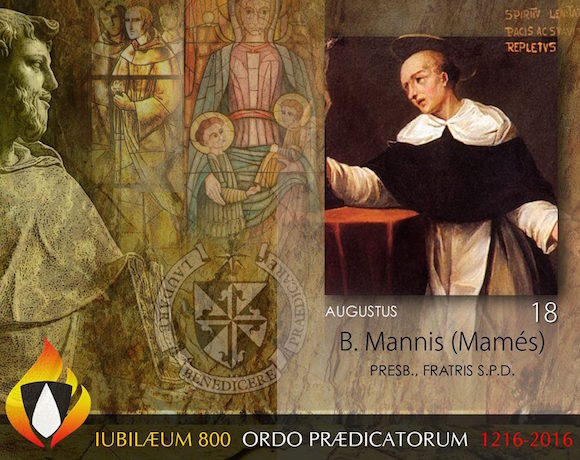
-by Br Matthew Jarvis, OP, English Province
“Brothers can be a mixed bunch. In the Bible, alas, it starts badly for brothers…
The older brother Cain murders Abel; the younger brother Jacob tricks Esau out of his birthright; and Joseph is left for dead by his eleven brothers. But, on the other hand, brotherly love can overcome great adversity. Joseph forgives his brothers and saves their lives. Look, too, at the early disciples of Christ: the brothers Peter and Andrew, James and John (sons of Zebedee), among many others. For them, being brothers in Christ was more important than consanguinity; yet it is a beautiful thing when the two brotherhoods overlap. After all, the love between blood brothers or sisters should point to, and school us in, the more perfect love between brothers and sisters in Christ. So, as it is written (Heb 13:1), let brotherly love continue!
Both kinds of brotherly love are evident at the very beginning of the Dominican Order. St Dominic was the youngest of three brothers. His eldest brother, Anthony (Antonio), was also a priest. But it is the middle brother, Manez (also spelt Manés, Mannes or Mames), who interests us here. Manez was old enough to have begun his own training for the priesthood when Dominic was born; but later, he joined Dominic in his preaching mission to the Albigensians. When the Order of Preachers was formally approved by the Pope, Manez was one of the first to receive the habit and make profession in the hands of Dominic, his younger brother.
Manez proved immediately to be active and devoted Dominican friar. He was among those sent by Dominic to Paris in the early dispersal of the brethren in 1217; there Manez was one of the founders of the St Jacques community. In 1219, he was sent to Madrid to be chaplain to the first community of Dominican nuns in Spain. After many more years of service, he died in 1238 and was buried at the Cistercian monastery in Gumiel de Izán.
We know very little else about the life of Manez. His contemporaries reported that he was a gentle and effective preacher, a prayerful and discreet friar. He was inclined towards the contemplative life, but did not hesitate to attend obediently to whatever task he was set. Friar Rodrigo de Cerrato called him a ‘gentle, humble, cheerful and kind and ardent preacher’.
This hiddenness and humility of Manez marks him out as a true brother of Dominic. If the greatness of Dominic owes much to his humility, his giving way to the brethren and the Order’s mission above his own personal status, then Manez has perhaps an equal claim to greatness: he devotedly served God in the Order his younger brother founded, not seeking his own advantage or aggrandisement but simply the salvation of souls.
Manez showed no sign of jealousy or sibling rivalry. After Dominic’s canonisation in 1234, he travelled to their hometown of Caleruega to persuade the people to build a church in his older brother’s honour. Although beatified by Gregory XVI, Manez has faded into the background of the Order’s history. But that is what he would have wanted. Dominicans exist to preach Jesus Christ, not themselves; and that is why Manez was a great Dominican.”
Blessed Mannes, an older brother of Saint Dominic, was born at Caleruega, Spain, about 1170. He was among his younger brother’s first followers and later assisted in establishing the priory of Saint-Jacques at Paris in 1217. In 1219 he was entrusted with the care of the Dominican nuns at Madrid. According to an early source he was “a contemplative and holy man, meek and humble, joyful and kind, and a zealous preacher.” He died at the Cistercian monastery of San Pedro at Garniel d’Izan near Caleruega about the year 1235.
The second reading taken from the supplement to the Liturgy of the Hours for the Order of Preachers:
From a letter of our Holy Father Dominic to the nuns of Madrid.
“Mannes has worked so hard to bring you to this holy state of life.”
Brother Dominic, Master of the Preachers, to the dear prioress of Madrid and all the nuns in the community, greetings. May you progress every day!
I am delighted at the fervor with which you follow your holy way of life, and thank God for it. God has indeed freed you from the squalor of this world.
Fight the good fight, my daughters, against our ancient foe, fight him insistently with fasting, because no one will win the crown of victory without engaging in the contest in the proper way. Until now you had no place where you could practice your religious life, but now you can no longer offer that excuse. By the grace of God, you have buildings that are quite suitable enough for religious observance.
From now on I want you to keep the silence in the prescribed places, namely, the refectory, the dormitory and the oratory, and to observe your Rule fully in everything else too. Let none of the sisters go outside the gate, and let nobody come in, except for the bishop or any other ecclesiastical superior, who comes to preach to you or to visitate. Be obedient to your prioress. Do not chatter with each other, or waste your time gossiping.
Because we can offer you no help in temporal affairs, we do not want to burden you by allowing any of the brethren any authority to receive women or make them members of your community; only the prioress shall have such authority, on the advice of the community.
Furthermore, I instruct my dear brother Mannes, who has worked so hard to bring you to this holy state of life, to organize you and make whatever arrangements he considers useful, to enable you to conduct yourselves in the most religious and holy way. I also give him power to visitate you and correct you, and, if necessary, to remove the prioress from office, provided that a majority of the nuns agree. I also authorize him to grant you any dispensations he thinks appropriate.
Farewell in Christ.”
Love,
Matthew

